 On December 13, the Lisbon Treaty was signed. Many say it's just that dreaded EU Constitution in disguise. It is not. For one thing, whereas the Constitution attempted to replace the earlier treaties and start "anew", so to say, the current treaty "merely" amends the existing key treaties of Rome (which established the European Community 50 years ago) and Maastricht (Treaty on European Union, 1992). Also, although that's rather cosmetics, any reference to (or declamation of) symbols defining a European superstate, like an EU flag, a hymn and a motto, is scrapped. Here are the key points:
On December 13, the Lisbon Treaty was signed. Many say it's just that dreaded EU Constitution in disguise. It is not. For one thing, whereas the Constitution attempted to replace the earlier treaties and start "anew", so to say, the current treaty "merely" amends the existing key treaties of Rome (which established the European Community 50 years ago) and Maastricht (Treaty on European Union, 1992). Also, although that's rather cosmetics, any reference to (or declamation of) symbols defining a European superstate, like an EU flag, a hymn and a motto, is scrapped. Here are the key points:1.) The European Union acquires International Judicial Accountability.
Strange though it may seem, until now the European Union did not exist as
such in the international judicial field. The Lisbon Treaty will change
that (one of the consequences will be that it can be charged by the
ICC in The Hague for, say, war crimes!)
2.) Simpler decision procedures.
Until now, decision making in the EU was, to put it simply, a mess... The EU Commission e.g. (its day-to-day "government"), could not simply take decisions with regards to foreign policy or justice and security. This was only true where the previous treaties had explicitly stated the EU stood above the member states, like agriculture and competition. Similarly, the European Parliament did not have a say in everything either. Often it found itself in only an advising capacity without the power to actually block the Commission's decisions. Try to imagine that the US federal government could only take nationwide measures in a limited number of fields, or that Congress' power was severely hamstrung.
All this will change after Lisbon. In theory, only one decision procedure remains: the EU commission proposes a decision, a bill or a policy, and the EP (and the minister councils) votes about it. One important domain remains the exception: foreign policy. The Commission still cannot "overrule" its member states with regards to foreign policy.
3.) An ever bigger grasp on European lawmaking
Simultaneously, the EU will now be responsible for a host of other domains on which it can implement EU-wide laws: energy, health, civil protection, climate change, public services, space travel, humanitarian aid, tourism, administrative cooperation.
4.) National parliaments get "alarm-bell procedure".
In order to limit the power of the EU Commission, the 27 member states will get a so-called "Alarm Bell Procedure" which they can invoke if they think the Commission exceeds its authority. In such a case, the EU Parliament must decide whether an EU decision must be annulled.
5.) A new way to "weigh" the votes.
Until now, every member state had a number of votes, and not everyone was pleased with the way the votes were attributed to the respective states. For instance, of the 345 votes to be allotted, Germany, with a population of roughly 80 million, had 29. Spain and Poland, with a population of around 40 million, had 27 votes each. The Treaty Of Lisbon determines that in the future (from 2014 on) 55% of the member states, representing a total of 65% of the European population, will be necessary for a decision. It comes at no surprise that the Poles fought fiercely to keep the present system, to no avail however.
6.) The power of the EP enlarges.
See also 2. The European Parliament will finally have a say in ALL decisions, including the EU's budget. In addition, the maximum number of seats in the EP is 750 plus the chairman from 2009 on (currently there are 785 members).
7.) A slimmer EU Commission
Until now, the Commission - the EU's "day to day government" - counted one "minister" per member state. With 27 member states and more to come, this has already proved to be far too many. From November 1, 2014 on, the EU Commission will be composed of a number of ministers (commissioners) corresponding with 2/3 of the member states. It is clear that the biggest member states will always have commissioners. The smaller ones will get commissioners following implementation of a rotating system.
8.) A European President.
The most visible measure. Instead of the grossly ineffective rotating "presidency" of the EU - every member state had the presidency for six months - Lisbon makes sure there will be ONE European President, to be chosen by an outfit called the European Council with a simple majority.
9.) A solidarity clause
Lisbon states that all member states must offer help to each other in case of, e.g., a terrorist attack or energy deficiencies.
10.) The Symbols
Important to note is that where the European Constituion established a flag, hymn and currency as the official symbols of the EU, this statement was omitted in the Treaty of Lisbon. Still, in a separate, unrelated agreement, sixteen member states recognized them.
11. Petition.
Also very important, if at least ONE MILLION EU citizens from a significan number of member states think that there should be a European law, they can ask the Commission to do so.
And there you have it. I must repeat once again, that I think it's a very sorry thing that the very concept of a United States of Europe is sabled down and again by Europes self-proclaimed "true" rightwing ideologues and parties. One finds this demeaning attitude in VB's programme as well as in the writings of TBJ's Daniel Hannan(himself a Europarliamentarian) and Paul Belien, amongst others. Sadly, the Euroskepticals are to be found exclusively on Europes Right. They fail to make the essential distinction between a tool and he who uses it, between the car and its driver. Like Don Quixote fighting windmills, the European Right figths the concept of a European Union, not those who steer it in the wrong direction. And I'm sorry to see this attitude is all too eager replicated across the ocean, where US rightwing commentators simply echo what is loudly proclaimed over here. A much more realistic attitude would be to accept that the European Union IS, and that the process which led to it cannot be reversed.
It is a political, economic and financial integration movement of which the logical outcome CAN ONLY BE a supranational state, and THIS DOESN'T HAVE TO BE BAD. From a purely ideological point of view, the Right's reluctance towards a USE makes sense: further integration will mean an even heavier European state apparatus, while the shift of responsibilities towards the "higher" level will not lead - at least not immediately - to slimmer national administrations. Still, this is a downside we have to accept, for the disadvantage is to a large degree offset by the gains that will be made. After all, from a purely financial POV, the costs of EU bureaucracy have been paid back many times over by the economic impetus Europe enjoyed as a result of the common market.
And of course, a unified Europe will be much more able to finetune a common policy with regards to critical domains in an increasingly complex world. A common foreign policy e.g., not the cacophony of 27 countries playing more or less cavalier seul. A common policy which tackles the immigration problem in a rational and smart way e.g., unlike the poor show seen now.
I remember that several years ago, the main objection of one of the founders of this blog, Kerry D., to more EU integration , was that an EU under the aegis of a prominent anti-American country would be a bad thing for the US. And she mentioned France and Chirac, which at the time certainly had a ring of self-evidence. But... first of all, dominance of one country has now become impossible, exactly because of the increased integration and the influx of more countries. And secondly, one must trust that a Europe still subscribing, theoretically at least, to the same core values that are held in such high esteem across the Atlantic, will still be a reliable partner to the United States of America even if it has morphed into the... United States of Europe. Think of it as the political equivalent of Adam Smith's invisible hand... but one one condition.
 And that condition is that Europes rightwingers should STOP BICKERING and whining over lost sovereignty. They should STOP LAMENTING the coming into being of the "EUSSR", because damn right that is what it will turn into, IF they prefer to stick on the sidelines and let the Left determine where to go with Europe. Since they cannot stop the process, they might as well get on board and GRAB THAT STEERING WHEEL, because naturally, the Left adores the concept of a superstate, for obvious reasons. A chance to indeed turn the USE into the EUSSR and once again try what their idelogical confreres tried in other big geopolical blocks, the USSR and China, under the motto "We just had bad luck over there, but this time it will work!". Europes rightwing parties and ideologues should formulate a strategy whereby whatever power they possess, be it in their national governments or in the EU Commission and the European Parliament itself, should be used to keep the USE "mean and lean", focused on its key policies: defense, justice, the common currency, finance, foreign policy, science, space exploration. The way it is now, the Euro right resembles more the proverbial barking dogs who see the caravan pass. Unfortunately, they seem not to realize what direction the fellas sitting on the camels are taking the caravan.
And that condition is that Europes rightwingers should STOP BICKERING and whining over lost sovereignty. They should STOP LAMENTING the coming into being of the "EUSSR", because damn right that is what it will turn into, IF they prefer to stick on the sidelines and let the Left determine where to go with Europe. Since they cannot stop the process, they might as well get on board and GRAB THAT STEERING WHEEL, because naturally, the Left adores the concept of a superstate, for obvious reasons. A chance to indeed turn the USE into the EUSSR and once again try what their idelogical confreres tried in other big geopolical blocks, the USSR and China, under the motto "We just had bad luck over there, but this time it will work!". Europes rightwing parties and ideologues should formulate a strategy whereby whatever power they possess, be it in their national governments or in the EU Commission and the European Parliament itself, should be used to keep the USE "mean and lean", focused on its key policies: defense, justice, the common currency, finance, foreign policy, science, space exploration. The way it is now, the Euro right resembles more the proverbial barking dogs who see the caravan pass. Unfortunately, they seem not to realize what direction the fellas sitting on the camels are taking the caravan.And last but not least a question for the Americans themselves: would YOU like to go back to the days before the US Constituion made a True Union of a hodgepodge of mini-states acting on themselves? The days when Pennsylavania, Connecticut, Virginia, Massachusetts and what not all had a petty army and navy of their own, when each of them had a self-important ambassador in Louis XVI's Paris, when each of them issued its own quasi-worthless currency? You may rant and rant against "Washington" and its meddling in the states' affairs, the very way the Euro right is now ranting against "Brussels", but can you imagine an America toppling the Taliban one month after 9/11 if it had had to reach a decision between 51 states first? Would California and Massachusetts still have supported bombing Kabul after one week? Would they even have supported deposing of Mullah Omar in the first place at all? SWould they not have suggested talking to him first???
Europe finds itself in the same situation now; Actually, precisely the reason for the lackluster support in the WOT thus far is because of the EU's lack of a common Foreign Policy. There is but one caveat I see: apart from grabbing the EU's steering wheel from the Left, Europes Right must first put its house in order. Europes Right must rediscover what it means to be "Right" again. As little government as possible. Promoting indivualism and self-reliance. Emphasizing the virtues of fending for yourself, of determining your own future, of a sound labor ethic. Open economies, free markets. Make Capitalism a fashionable word again. Respect our heritage, reinstate the importance of the Family as the Cornerstone of Society. Instill in our youths a Respect also, or even especially, for our judeo-christian roots and the quintessential, ultimately benign role our christian religion has played over the centuries.
If Europes Right can do that, become truly "Right" again, AND have its say in Europes integration process, then a USE will, and can, do good for its citizens. Then a USE does not need to be a nightmare for the USA. To the contrary: it could be the beginning of a Grand Transatlantic Alliance. It is up to Europes Right which course they prefer.
MFBB.

 Belgium finally has
Belgium finally has 
 Is everything doom and gloom, then? Luckily, it is not. One of the very few silver linings - possibly the only one - is that the post of Minister of Defense goes to Pieter De Crem of the Flemish Christian Democrats. If there is one man who continuously addressed the question of the castration of the Belgian Army at the hands of André Flahaut (PS) during his eight-year long catastrophic tenure, it is Pieter De Crem. One of his most memorable quotes is: "André Flahaut is the biggest disaster happening to the Belgian Army since the defeat against the Germans in 1940." That Decrem is now responsible for Defense is sweet revenge for someone who vowed last Spring "that he would make sure that Flahaut would never again be Secretary of Defense". On many occasions, De Crem has deplored the very meagre contributions of Belgian troops in WOT theaters, its most significant undertaking being that in Afghanistan, where some 360 troops are guarding and managing Kabul Airport in a near risk-free environment. It is possible - it just might - that with this man Belgium may act a bit more in a responsible way with regards to its international obligations.
Is everything doom and gloom, then? Luckily, it is not. One of the very few silver linings - possibly the only one - is that the post of Minister of Defense goes to Pieter De Crem of the Flemish Christian Democrats. If there is one man who continuously addressed the question of the castration of the Belgian Army at the hands of André Flahaut (PS) during his eight-year long catastrophic tenure, it is Pieter De Crem. One of his most memorable quotes is: "André Flahaut is the biggest disaster happening to the Belgian Army since the defeat against the Germans in 1940." That Decrem is now responsible for Defense is sweet revenge for someone who vowed last Spring "that he would make sure that Flahaut would never again be Secretary of Defense". On many occasions, De Crem has deplored the very meagre contributions of Belgian troops in WOT theaters, its most significant undertaking being that in Afghanistan, where some 360 troops are guarding and managing Kabul Airport in a near risk-free environment. It is possible - it just might - that with this man Belgium may act a bit more in a responsible way with regards to its international obligations. SADIA, 20 YEARS, TOO WESTERNIZED TO LIVE (27/10/2007). Her brother, searched after by the Antiterrorist Cell, still at large.
SADIA, 20 YEARS, TOO WESTERNIZED TO LIVE (27/10/2007). Her brother, searched after by the Antiterrorist Cell, still at large. Mehmet Koksal is a Belgian blogger of Turkish descent and a (very) rare example of an independent Turkish mind. On his blog
Mehmet Koksal is a Belgian blogger of Turkish descent and a (very) rare example of an independent Turkish mind. On his blog 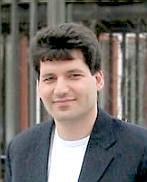
 The
The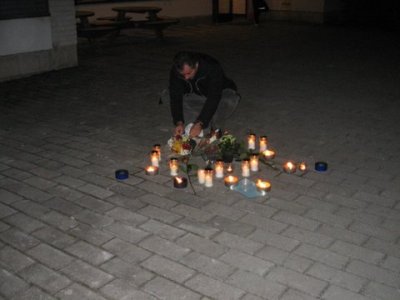
 As most people who get their news from blogs know by now, Paris saw a severe flare-up of the so-called French Intifada again the previous week. The incident that sparked the street violence was the accidental death on Sunday November 25 of two teenagers, Mouhsin and Lakhamy, who had no ancestors in Norway nor in Lithuania, Denmark or Wales. While driving without the compulsory crash helmets on a stolen motorcycle in the Parisian suburb of Villiers-le-Bel, they crashed at breakneck speed into a police vehicle. Their death signalled the start of extremely violent riots in which an enraged and hysterical mob already the same night
As most people who get their news from blogs know by now, Paris saw a severe flare-up of the so-called French Intifada again the previous week. The incident that sparked the street violence was the accidental death on Sunday November 25 of two teenagers, Mouhsin and Lakhamy, who had no ancestors in Norway nor in Lithuania, Denmark or Wales. While driving without the compulsory crash helmets on a stolen motorcycle in the Parisian suburb of Villiers-le-Bel, they crashed at breakneck speed into a police vehicle. Their death signalled the start of extremely violent riots in which an enraged and hysterical mob already the same night 
 Bajaka's death set off
Bajaka's death set off  Apparently both developments were too much for hundreds of Turkish hotheads, who on Sunday October 21 took to the streets of Sint-Joost-ten-Node, leaving a trail of destruction behind them. Cars were torched, public infrastructure destroyed, shops looted. Upon passing a cafe called "Le Jardin de Babylone", the mob discovered it was run by an Armenian, a certain Mr. Peter Petrossian. Concrete blocks were smashed through the windows, the guests chased away and the interior destroyed. Mr. Petrossian, who had to flee for his life, recalls that the thugs shouted:
Apparently both developments were too much for hundreds of Turkish hotheads, who on Sunday October 21 took to the streets of Sint-Joost-ten-Node, leaving a trail of destruction behind them. Cars were torched, public infrastructure destroyed, shops looted. Upon passing a cafe called "Le Jardin de Babylone", the mob discovered it was run by an Armenian, a certain Mr. Peter Petrossian. Concrete blocks were smashed through the windows, the guests chased away and the interior destroyed. Mr. Petrossian, who had to flee for his life, recalls that the thugs shouted:  The Brussels 2007 muslim riots conjure up memories of the 2006 riots, although these were mostly, if not exclusively, the work of Moroccan thughs. On September 24, 2006, a 25-year old inmate of Vorst prison, Fayçal Chaaban, acted so violently against the prison guards that they sedated him. When upon awakening he continued to beat and shout, a second dose was administered. Apparently this was an overdose, since he never woke up again. When news of his death seeped out the day after, this was the signal for a Moroccan mob to start violent riots in the Marollen neighborhood in central Brussels. Several cars and a shop were torched, windows smashed, and a trail of devastation was left in their wake. This went on for several days. Buses and trams full of commuters were pelted with stones, bus stops were shattered, and a youth center at the Place de la Querelle was burned. The firemen trying to extinguish the flames were attacked. Perhaps the most repulsive act was when the scumbags threw two molotov cocktails into the Saint Peter Hospital, luckily without too much damage...
The Brussels 2007 muslim riots conjure up memories of the 2006 riots, although these were mostly, if not exclusively, the work of Moroccan thughs. On September 24, 2006, a 25-year old inmate of Vorst prison, Fayçal Chaaban, acted so violently against the prison guards that they sedated him. When upon awakening he continued to beat and shout, a second dose was administered. Apparently this was an overdose, since he never woke up again. When news of his death seeped out the day after, this was the signal for a Moroccan mob to start violent riots in the Marollen neighborhood in central Brussels. Several cars and a shop were torched, windows smashed, and a trail of devastation was left in their wake. This went on for several days. Buses and trams full of commuters were pelted with stones, bus stops were shattered, and a youth center at the Place de la Querelle was burned. The firemen trying to extinguish the flames were attacked. Perhaps the most repulsive act was when the scumbags threw two molotov cocktails into the Saint Peter Hospital, luckily without too much damage... The second thing is that, no matter how illogical the behaviour of the muslim crowds is, we are and remain faced with it. It is not going to change, to the contrary. The muslim riots, getting worse with every passing year, are a signal that our legal and judicial systems are put to the test. If anything is clear from what happened at Villiers-le-Bel, Slotervaart or Sint-Joost-ten-Node, it's that these riots are meant to indicate that territory is being claimed. Few things illustrate this more clearly than the sea of blood red Turkish flags and the ubiquitous posters of Kemal Ataturk in the latter community. And these flags and posters illustrate too the utter failure of the multicultural pipedream.
The second thing is that, no matter how illogical the behaviour of the muslim crowds is, we are and remain faced with it. It is not going to change, to the contrary. The muslim riots, getting worse with every passing year, are a signal that our legal and judicial systems are put to the test. If anything is clear from what happened at Villiers-le-Bel, Slotervaart or Sint-Joost-ten-Node, it's that these riots are meant to indicate that territory is being claimed. Few things illustrate this more clearly than the sea of blood red Turkish flags and the ubiquitous posters of Kemal Ataturk in the latter community. And these flags and posters illustrate too the utter failure of the multicultural pipedream.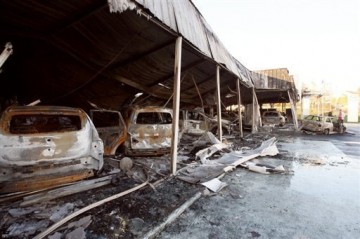
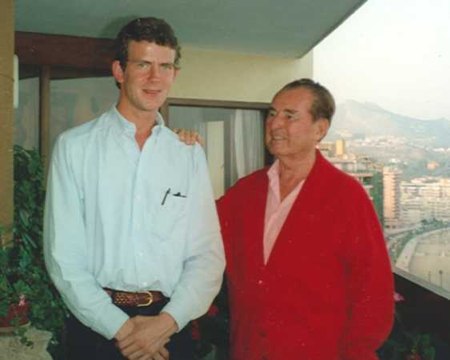

 The charging knight evokes the glorious "Walloon" past with its powerful medieval counties, a.o. the County of Hainaut, and the Prince-Bishopric of Liège (the name "Wallonia" does in fact not emerge until the 19th century). In the winter of 1943-1944, Degrelle's unit was encircled, together with various other Waffen SS and Wehrmacht units, in the notorious
The charging knight evokes the glorious "Walloon" past with its powerful medieval counties, a.o. the County of Hainaut, and the Prince-Bishopric of Liège (the name "Wallonia" does in fact not emerge until the 19th century). In the winter of 1943-1944, Degrelle's unit was encircled, together with various other Waffen SS and Wehrmacht units, in the notorious 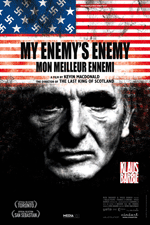 Their homepage proudly displays an ad for the upcoming movie
Their homepage proudly displays an ad for the upcoming movie  The proverbial elephant in the Hall of Political Correctness is that while all leftists cry murder whenever some compromising photo taken twenty years ago comes out, they, on the other hand, still demonstrate a kingly nonchalance in the practice of revering "their" heroes. In Spring 2006,
The proverbial elephant in the Hall of Political Correctness is that while all leftists cry murder whenever some compromising photo taken twenty years ago comes out, they, on the other hand, still demonstrate a kingly nonchalance in the practice of revering "their" heroes. In Spring 2006,  Let that be no problem for our moral betters at home: leftwing politicians still revere the old monster, and while there visibly enjoy being in a country where society and even Man itself is still makeable. The photo, taken a few years back, shows you former Foreign Minister Erik De Rijcke, now Minister of State, enjoying the company of El Lider. De Rijcke is a prominent member of the Flemish socialist party
Let that be no problem for our moral betters at home: leftwing politicians still revere the old monster, and while there visibly enjoy being in a country where society and even Man itself is still makeable. The photo, taken a few years back, shows you former Foreign Minister Erik De Rijcke, now Minister of State, enjoying the company of El Lider. De Rijcke is a prominent member of the Flemish socialist party  IDENTITY AND DEMOCRACY.
IDENTITY AND DEMOCRACY.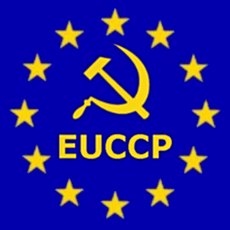 Ladies and gentlemen, there you have it: Punishable by Effective, Proportionate and Dissuasive Criminal Penalties. In other words, this so-called "Holocaust Resolution" provides nothing less than a "legal" instrument to kill parties opposing, a.o., unbridled immigration!THAT is the reason why the Vlaams Belang did not sign it!!! It's leftist reasoning all over again. If you can't beat them, sue them. You do not have to tell Filip Dewinter what that means. In a 2005 interview with a Jewish weekly he said a.o.
Ladies and gentlemen, there you have it: Punishable by Effective, Proportionate and Dissuasive Criminal Penalties. In other words, this so-called "Holocaust Resolution" provides nothing less than a "legal" instrument to kill parties opposing, a.o., unbridled immigration!THAT is the reason why the Vlaams Belang did not sign it!!! It's leftist reasoning all over again. If you can't beat them, sue them. You do not have to tell Filip Dewinter what that means. In a 2005 interview with a Jewish weekly he said a.o. 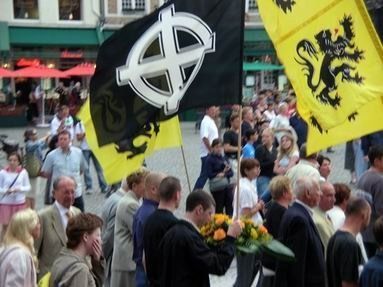
 2006 marked the first year that immigrants who do not even WISH Belgian nationality, were allowed to vote in municipal elections - exactly the reason why I joined the VB, btw. It was a common phenomenon that Moroccans, Turks and Algerians voted only for "their" candidates, which resulted in hitherto unknown Ahmeds, Fatimas and Alis, posted on "unelectable" places on (especially socialist and green) voting lists, miraculously jumped over the gullible indigenous "white" candidates. In Ghent, a Turkish candidate, Fuat Korkmazer, profiled himself in the first place as a Turk, NOT as a Belgian. Just LOOK at that poster (in Turkish!), and now look at
2006 marked the first year that immigrants who do not even WISH Belgian nationality, were allowed to vote in municipal elections - exactly the reason why I joined the VB, btw. It was a common phenomenon that Moroccans, Turks and Algerians voted only for "their" candidates, which resulted in hitherto unknown Ahmeds, Fatimas and Alis, posted on "unelectable" places on (especially socialist and green) voting lists, miraculously jumped over the gullible indigenous "white" candidates. In Ghent, a Turkish candidate, Fuat Korkmazer, profiled himself in the first place as a Turk, NOT as a Belgian. Just LOOK at that poster (in Turkish!), and now look at